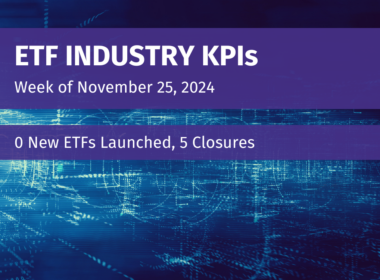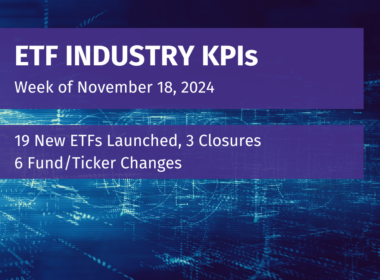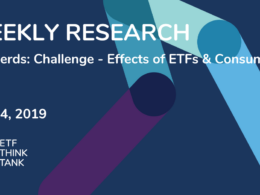Last week, Fidelity announced the filing of two index based mutual funds with a “ZERO” management fee.
Fidelity ZERO℠ International Index Fund FZILX
Fidelity ZERO℠ Total Market Index Fund FZROX
Not surprisingly, this sent shock waves throughout the ETF world causing companies like Blackrock, Invesco and Wisdomtree to drop about 5%. It also negatively impacted TETFindex with a decline of about 1.5%.
Eric Balchunas from Bloomberg declared: “Fidelity won the race to zero”.

Wait, there are No Free Lunches
The Toroso ETF Thinktank Team decided to delve into the 184 page filing and read the 83,600 word prospectus to determine just how free these funds are. Secondly, the obvious and nagging question: “Why a mutual fund instead of an ETF?” What we found was that the answer to both questions was the same.
So, let’s begin with the materiality of this filing: Charles Schwab (SCHB) and Blackrock (ITOT) already offer total market exposure for 0.03% in an ETF wrapper. Is 0.00% really that much better, especially when offered in the less tax efficient vehicle of the mutual fund? Also, there is already an ETF that chargers zero management fee from Cambria (GAA) that does include about 0.30% of operational cost. Meb Faber and Cambria team forgo their management fee in exchange for collecting fees from affiliated products and Securities Lending. So this is the first place we looked for Fidelity’s motives.
Security Lending, “I’ll gladly pay you Tuesday for a hamburger today.”
Security lending is a common practice in the investing world where a fund manager lends securities to other institutions for shorting purposes. The fund usually receives a hefty fee for this lending that is often split between the fund shareholders and the management company. With Fidelity, it appears they don’t exclude the management company from participating in fees, but the prospectus excerpt below implies that the fund will retain the fees:
Securities Lending. A Fidelity® fund may lend securities to parties such as broker-dealers or other institutions, including an affiliate. Fidelity® funds for which Geode Capital Management, LLC (Geode) serves as sub-adviser will not lend securities to Geode or its affiliates. Securities lending allows a fund to retain ownership of the securities loaned and, at the same time, earn additional income… Cash received as collateral through loan transactions may be invested in other eligible securities, including shares of a money market fund. Investing this cash subjects that investment, as well as the securities loaned, to market appreciation or depreciation.
Affiliates, “Lunch is on my expense account.”
It appears the prospectus implies security lending revenue is not the motivator or profit center for these two “free” index mutual funds, but the passage does bring up another issue; revenue to affiliates. See prospectus excerpt below:
Geode may place trades with certain brokers, including National Financial Services LLC (NFS) and Luminex Trading & Analytics LLC (Luminex), with whom FMRC is under common control, provided it determines that these affiliates’ trade execution abilities and costs are comparable to those of non-affiliated, qualified brokerage firms.
There does seem to be some fees being applied from one entity within Fidelity to another. This shuffling of the deck is common, but at the end of the day, it still appears that no fee is being derived from the shareholder.
The Lunch is Free at Only One Restaurant
Our ETF Thinktank conclusion is that these Zero Fee funds are actually zero fee, as long as you purchase them at Fidelity. See below:
Purchase and Sale of Shares: Shares of the fund are available only to individual retail investors who purchase their shares through a Fidelity brokerage account, including retail non-retirement accounts, retail retirement accounts (traditional, Roth and SEP Individual Retirement Accounts (IRAs)), health savings accounts (HSAs), and stock plan services accounts.
These two mutual funds can only be purchased at Fidelity, their motive is to capture new clients. This restriction on purchase cannot be done with ETFs. ETFs trade on exchanges, the benefits of liquidity, transparency and tax efficiency are worth way more than 0.03%. So, therefore, Fidelity is offering these mutual funds to acquire new clients, as opposed to free ETFs that would actually be of superior value to investors. That is why this non-altruistic move by Fidelity is not a meaningful threat to growth of the ETF industry or TETF.index. Following up on our piece about, “The ETF industry is not just about sponsors” we thought we would drill down and highlight a peculiar set of coincidences about the index battle between MSCI and FTSE. Truth be told, the success of the ETF industry is about investors looking for access to markets and solutions, liquidity, innovation and arguably all of this is driven by data and the index providers. Many may know that MSCI is public, but some may not know that FTSE Russell is owned by the London Stock Exchange (LSE) which is a 1.4% weighting in the index. MSCI is a 6.5% weighting in the TETFIndex.












